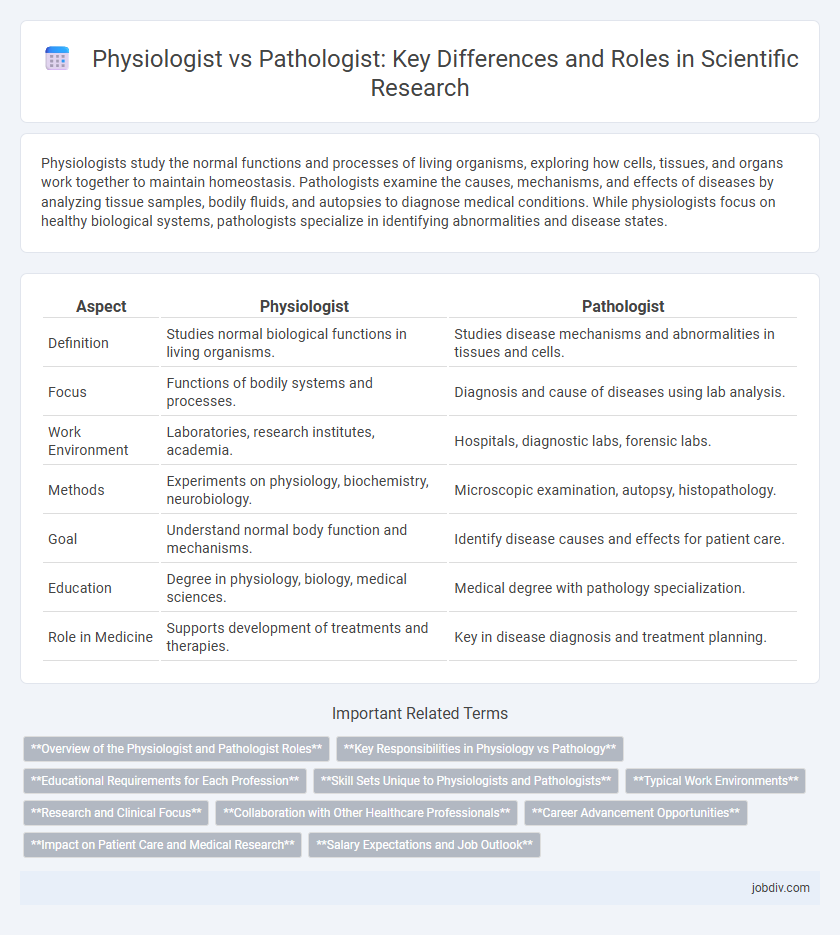Physiologists study the normal functions and processes of living organisms, exploring how cells, tissues, and organs work together to maintain homeostasis. Pathologists examine the causes, mechanisms, and effects of diseases by analyzing tissue samples, bodily fluids, and autopsies to diagnose medical conditions. While physiologists focus on healthy biological systems, pathologists specialize in identifying abnormalities and disease states.
Table of Comparison
| Aspect | Physiologist | Pathologist |
|---|---|---|
| Definition | Studies normal biological functions in living organisms. | Studies disease mechanisms and abnormalities in tissues and cells. |
| Focus | Functions of bodily systems and processes. | Diagnosis and cause of diseases using lab analysis. |
| Work Environment | Laboratories, research institutes, academia. | Hospitals, diagnostic labs, forensic labs. |
| Methods | Experiments on physiology, biochemistry, neurobiology. | Microscopic examination, autopsy, histopathology. |
| Goal | Understand normal body function and mechanisms. | Identify disease causes and effects for patient care. |
| Education | Degree in physiology, biology, medical sciences. | Medical degree with pathology specialization. |
| Role in Medicine | Supports development of treatments and therapies. | Key in disease diagnosis and treatment planning. |
Overview of the Physiologist and Pathologist Roles
Physiologists study the functions and mechanisms in living organisms, focusing on how cells, tissues, and organs work together to maintain life processes. Pathologists diagnose diseases by examining tissues, cells, and organs, analyzing abnormalities to understand disease progression and inform treatment. Both roles are integral in medical research and healthcare, with physiologists emphasizing normal biological functions and pathologists concentrating on disease pathology.
Key Responsibilities in Physiology vs Pathology
Physiologists study normal biological functions and processes, conducting experiments to understand how cells, tissues, and organs operate under various conditions. Pathologists focus on diagnosing diseases by examining tissue samples, bodily fluids, and conducting autopsies to determine pathological changes and causes of illness. Both professionals utilize laboratory techniques, but physiologists aim to elucidate healthy function, while pathologists identify abnormalities related to disease.
Educational Requirements for Each Profession
Physiologists typically require a bachelor's degree in biology or physiology, followed by a master's or doctoral degree (PhD) specializing in human or animal physiology to conduct research or teach at the university level. Pathologists must complete a medical degree (MD or DO), followed by a residency in anatomic or clinical pathology and often pursue board certification to practice diagnosing diseases through laboratory analysis and autopsies. The educational pathway for physiologists emphasizes research and experimental methods, while pathologists focus extensively on clinical training and medical diagnostics.
Skill Sets Unique to Physiologists and Pathologists
Physiologists specialize in understanding normal biological functions and processes, with skills in experimental design, data analysis, and advanced techniques like electrophysiology and metabolic assessments. Pathologists possess expertise in diagnosing diseases through microscopic examination of tissues, utilizing histopathology, molecular diagnostics, and forensic analysis. Both professions require strong analytical skills, but physiologists focus on function and mechanisms while pathologists concentrate on disease identification and pathology.
Typical Work Environments
Physiologists primarily work in research laboratories, universities, hospitals, and rehabilitation centers where they study the functions of biological systems. Pathologists typically operate in clinical laboratories, hospitals, and medical examiner offices, diagnosing diseases through the examination of tissues, cells, and bodily fluids. Both professions require access to advanced laboratory equipment but serve distinct roles in health science diagnostics and research environments.
Research and Clinical Focus
Physiologists specialize in studying the normal functions and mechanisms of living organisms at molecular, cellular, and systemic levels, contributing to foundational research in biology and medicine. Pathologists focus on diagnosing diseases by examining tissues, cells, and bodily fluids, providing essential clinical insights into disease mechanisms and progression. Research in physiology informs preventive medicine and therapeutic development, while pathology bridges laboratory findings with patient care through diagnostic accuracy.
Collaboration with Other Healthcare Professionals
Physiologists and pathologists collaborate closely with healthcare professionals to enhance patient diagnosis and treatment plans. Physiologists contribute insights into normal and abnormal bodily functions, informing rehabilitation and preventive care, while pathologists provide critical laboratory analysis of disease processes. Their interdisciplinary cooperation ensures accurate interpretations and comprehensive care strategies in clinical settings.
Career Advancement Opportunities
Physiologists advancing in their careers often pursue specialized research roles or academic positions in biomedical sciences, benefiting from emerging fields like exercise physiology and neurophysiology. Pathologists have diverse advancement opportunities including leadership roles in hospital laboratories, involvement in diagnostic innovations, and participation in clinical trials that leverage molecular pathology techniques. Both careers demand continual education to stay current with technological advancements, but pathologists typically experience broader interdisciplinary collaboration due to their direct role in disease diagnosis and management.
Impact on Patient Care and Medical Research
Physiologists contribute to patient care and medical research by studying normal bodily functions, enabling the development of treatments that restore or enhance physiological processes. Pathologists impact patient care through the diagnosis of diseases via tissue and laboratory analysis, guiding targeted therapies and personalized medicine. Their research advances understanding of disease mechanisms, improving diagnostic accuracy and contributing to the development of new medical interventions.
Salary Expectations and Job Outlook
Physiologists typically earn an average annual salary ranging from $60,000 to $90,000, with demand driven by sectors such as sports science, rehabilitation, and research institutions. Pathologists command higher salaries, often between $200,000 and $400,000 annually, due to their critical roles in diagnosing diseases in healthcare and laboratory settings. Job outlook for physiologists is steady with moderate growth linked to increased emphasis on preventive health, while pathologists face strong demand fueled by advancements in medical diagnostics and an aging population.
Physiologist vs Pathologist Infographic

 jobdiv.com
jobdiv.com